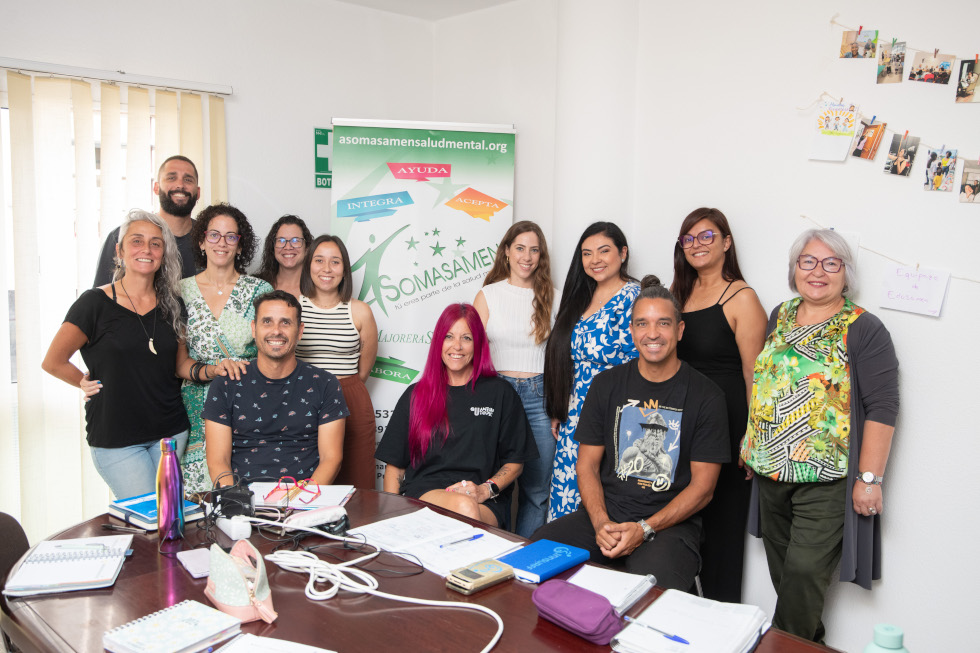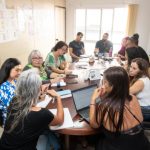
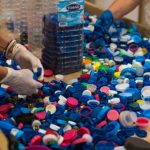
The Canary Islands Gold Medal received by the Majorera Association for Mental Health (Asomasamen) on May 30 recognizes the work of this group for the integration and well-being of people. Asomasamen was born 23 years ago to provide a response, then almost intuitive, to the growing demand for support for families affected by cases of serious mental disorders.
Its current president, Ana Trujillo, explains that new assistance programs gradually began to be created and practically from the beginning they saw the importance of working on prevention. “With this award we want to remember the work of the founding families and the personal and collective effort developed to create tools to combat these problems,” she says.
Asomasamen is a transparent, non-profit entity that is proud to have been a pioneer in this type of initiatives and that continues to be committed to the implementation of programs with a multidisciplinary approach, ranging from individual support to social integration, through of therapeutic and preventive activities.
“Now, science has confirmed that the combination of occupational therapies, physical activities and awareness programs contribute to improving the quality of life of users,” Trujillo highlights. These practices promote autonomy, improve social and cognitive skills, and foster a supportive environment that is crucial for rehabilitation.
“At Asomasamen we work on individualized support, we organize leisure and free time activities, sports, or horticulture workshops with professional instructors,” reports its president. They fight every day to end the social stigma suffered by many people suffering from mental health problems and to achieve greater respect and integration in the workplace, which is one of the great challenges. “We must remember the hard beginnings in collecting solidarity caps to help families without resources, which we have consolidated with new collection points, and how much we have grown thanks to the help of institutions,” Ana highlights.
Currently, 56 users from Fuerteventura participate in the association and 23 attend the family respite program. In terms of information and advice, this year Asomasamen has served 35 people. In 2023 they counted 53 users and 60 the previous year.
A necessary program is Connecting with Life, which pursues the social inclusion of people who suffer from a disorder through the development of leisure activities and free time in the environment, with the aim of avoiding isolation, lack of motivation and reinforcing acquisition. of social skills. This daily program consists of two groups: one in the south, in Gran Tarajal, and the other in the north, in Puerto del Rosario.
Its instructor, Nico Martín, highlights that “it is a diverse group in terms of tastes, preferences, ages, opinions and other issues.” “But we are capable of empathizing, being supportive of each other so that all the people who are part of the project can enjoy and take advantage of the activities,” he adds. Nico highlights the purpose of continuous learning and feels highly valued by everyone.
Personal autonomy
The tutor of the Metamorfosis program, Fátima Pérez, states that the fundamental objective is to promote the development of personal autonomy, as well as the integration of the person in the community, through support and encouragement of the person’s involvement in their process. recovery.
In this project, goals are set based on person-centered planning, that is, taking into account their needs, demands and personal characteristics. It offers individualized care, in the person’s home or environment, and visits are made in the morning. “The evolution is very noticeable since they begin to develop personal autonomy and maintain a decent quality of life. The advantage is that we work individually to get each person involved in their recovery process,” Pérez summarizes.
Another workshop that has great success is Sowing seeds, collecting illusions. Through therapeutic horticulture we seek to activate the person’s capabilities, in an outdoor space, to promote health, social relationships and teamwork, under the supervision of an agricultural monitor. The gavias are found in Valles de Ortega and two groups come: one from Puerto del Rosario and another from Gran Tarajal. The monitor, Laura Marcuño, highlights the benefits of connecting with nature: “Seeing that the work bears fruit, planting, collecting and being able to eat those vegetables is very satisfying.”
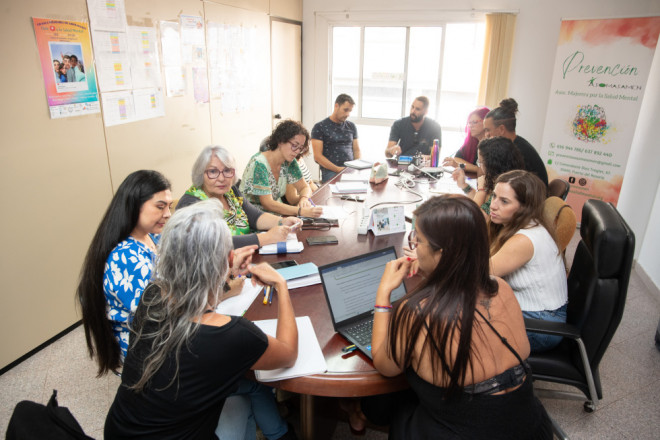
Meeting of the Asomasamen collective. Photo: Carlos de Saá.
They fight every day to end the social stigma of mental health problems
For its part, the Activa-T sports group emerged in 2020, as a result of the demand for more physical activity by some users in the northern part of the Island. The objective of this activity is to promote social relationships of the people attending, as well as improve their self-esteem, reduce stress levels and improve their physical condition.
Another pioneering program was Creating paths, which was born in 2021. Users in the southern area asked to go out and see the places on the Island. Thus, it has managed to promote mental and physical health, and has provided them with numerous benefits, such as breathe fresh air or be able to escape your mind simply by observing the landscapes that surround you. For the guide, Alejandro Abaroa, it is an activity that provides “freedom, happiness and the possibility of experiencing the details of daily life in a human way.”
Abaroa adds that what seems simple for many people may be complicated for other people, such as “entering a cafeteria, deciding what to drink, getting out of routine, socializing with other people or changing environments.” All of this makes it beneficial for your recovery. In that sense, Gustavo Hernández, in charge of the social integration plan, talks about personal improvement, accompaniment and putting oneself in their place. “It encourages me to see the progress, each person reacts in a different way but they all fight to recover their life before the diagnosis.”
Young population
A revolutionary prevention program in Fuerteventura was Edusamen, which was created to educate about mental health in schools, through awareness talks aimed at children and young people. They address key issues, such as self-esteem, depression, suicide, grief, stress, academic pressure, the influence of social networks, addictions, eating disorders and personal relationships. Educator Eliseo Fernández highlights that “treating mental health in classrooms is an acquired challenge.” “The students actively participate, tell experiences, ask questions and the final balance is very enriching for all parties,” he emphasizes.
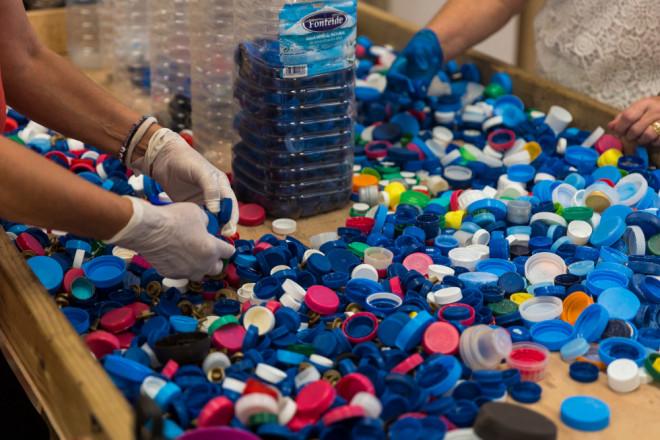
Collection of solidarity caps. Photo: Pedro Riteco.
Eliseo Fernández, pedagogue: “Treating mental health in classrooms is a challenge”
When the teaching team observes students’ behaviors or attitudes related to mental disorders, they propose to the association to work together, through sessions that must last over time, with which very positive results are achieved. Psychologist Miriam de los Ángeles Cisse observed that certain knowledge acquired in the classroom leaves its mark: “When we return months later, they remember the topics discussed, the group dynamics, and show a very favorable attitude.” “Educating in mental health provides enormous gratification, on a personal and professional level, and you can see the growth of the group,” she adds.
Also the social educator Yamiley García, who collaborates with Asomasamen, highlights the projection achieved by Edusamen, by increasing the number of students each year and obtaining social and institutional recognition. As for the data, in this course alone they have worked with 3,900 students and teachers. Last year they exceeded 4,700 and a thousand in 2022, because it started at the end of the year.
““Work together”
“My goal is for the population to understand the importance of working together to combat this disease, with information, respect and dignity,” insists the president of Asomasamen. To do this, the group needs to increase its network of members, who pay a fee of 30 euros per year, to function autonomously. “Every year we have grown in programs and assistance, and all of this results in the well-being of Majorera society,” Trujillo concludes.
In 2020, Asomasamen was declared an Entity of Public Interest by the Cabildo of Fuerteventura. In addition, this association is registered in the Registry of Associations of the Canary Islands and belongs to the Confederation of Mental Health Associations of Spain. He is also a member of CIRPAC (Insular Rehabilitation and Community Action Council) of Fuerteventura and the Insular Health Council. The group belongs to the Fuerteventura Accessibility Council and the Puerto del Rosario Citizen Participation Council, and collaborates in the provision of Social Services of the Government of the Canary Islands. An exemplary trajectory achieved with the effort and dedication of families who felt unprotected 20 years ago due to the lack of assistance and mental health support programs.

